Kristel Kont talked to Estonian writers Vahur Afanasjev and Justin Petrone about writing at the time of the coronavirus pandemic and the shifts they are observing in literature and society.
Vahur Afanasjev is an Estonian writer and poet who became a household name in the Estonian literary scene with his novel “Serafima and Bogdan” (2017), a story spanning several generations in a Russian Old Believers village on Lake Peipus, Estonia. His latest novel, “Õitsengu äärel” (“On Brink of Bloom”), was released in November 2020.
Justin Petrone is a US-born writer and journalist who first moved to Estonia in 2003. He is the author of nine books, among others the “Minu Eesti” (“My Estonia”) trilogy and the novel, “Montreali deemonid” (“The Demons of Montreal”). The English version of his latest book, “Minu Viljandi” (“My Viljandi”), will be available in 2021.
In 2020, we saw a lot of people shift to home offices. Did anything change for you at all? I guess Justin was not able to write in cafes as much as he is used to…
Justin: It is just easier for me to work in a cafe because that way I don’t have to worry if I’m hungry, I can just order a bowl of soup. They take good care of me. But we were only shut down really from March to May, and then life sort of went back to normal.
I miss travelling, of course. There’s a certain paranoia even about traveling within Estonia. Like if you go to Tallinn, you’re afraid you might be exposed to a virus or something like that. So you’re sort of stuck on repeat, doing the same day every single day. I guess I was mentally prepared to go through this year like this, but I’m not sure if I’m mentally prepared to do all of 2021 the same way.
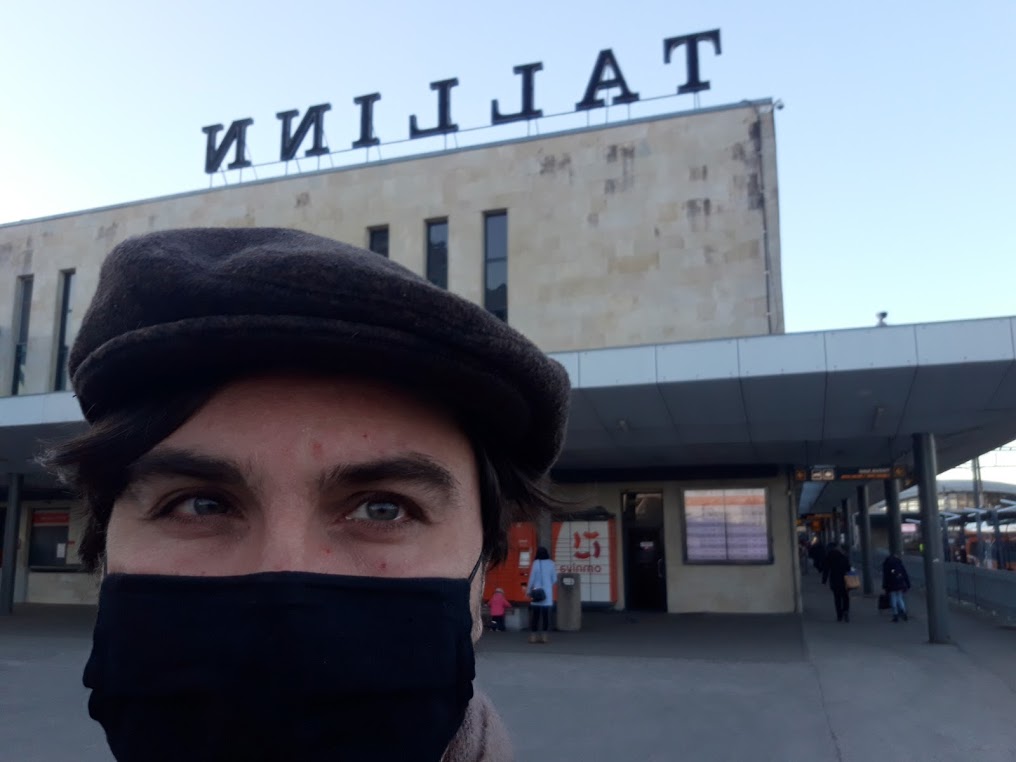
Vahur: I was anyway living in the countryside, pretty isolated. So I didn’t feel the change as much. Although now it’s slowly getting on my nerves, too.
Writing itself has not changed ‒ it has always been a lonely profession, at least for me. I mean, I’m okay with people but then I don’t enjoy working in teams so much – I want to be the boss. As a writer, I can boss around my characters. It’s like directing a play without any of the personal dramas and conflicts that you get in real life – not just with actors, but in any organisation.
Do you think this period will inspire some great literary works?
Justin: There were certain writers like George Orwell and Aldous Huxley, who wrote social satires in the 1920s and 1930s and then, after WWII, they started writing dystopian novels about dark futures with authoritarian states. The output very much changed in terms of the types of books they were writing.
Maybe writers across the board are going to start writing more books about not necessarily pandemics but global crises and reactions to them ‒ less about individuals and more about the society.
Vahur: I accidentally started writing a novel about a global danger already three years ago and finished it this spring. I actually considered a pandemic but for better or worse used an asteroid as the threat to get things going in “Õitsengu äärel”. It is a novel about the society but, then again, it’s very much about individuals.
The relationship between the individual and society and masses ‒ I think this could come to focus. When we think about Orwell, especially 1984, it’s not only a dystopian view of messed up societies. It’s also the most pathetic tragedy of an individual living in this horrible situation.
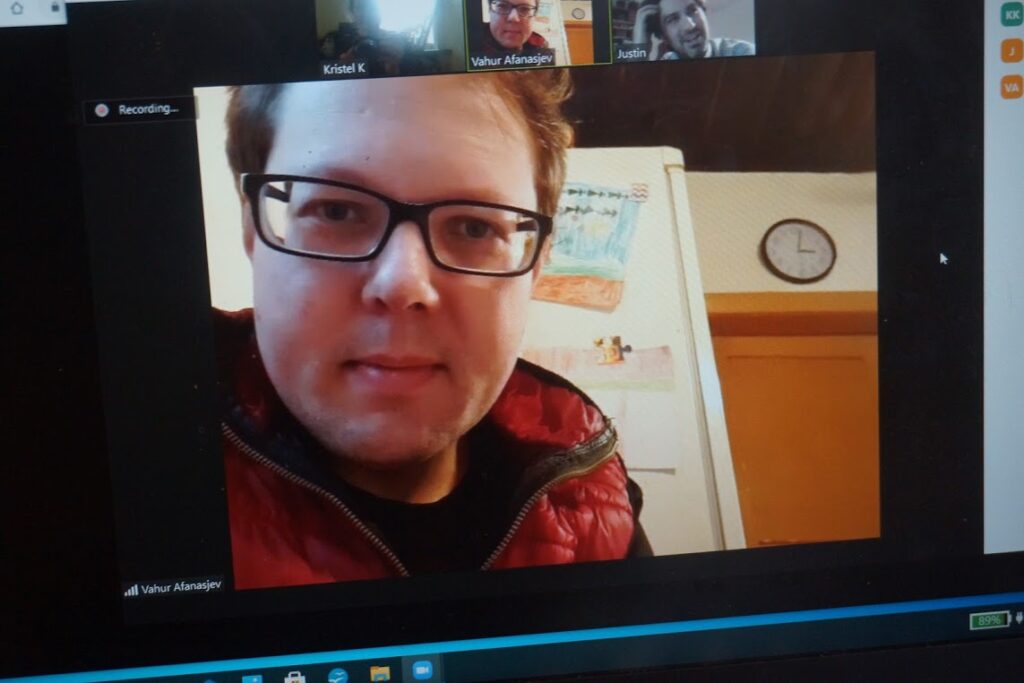
Justin’s new book “My Viljandi”, on the other hand, is not about an asteroid menacing civilization, but life in a small town of 20,000 inhabitants in central Estonia. I was surprised to read how vibrant the social scene is in Viljandi. All these writers, musicians, cafes, bars ‒ and expat men. Is Viljandi the true cultural capital of Estonia instead of Tartu?
Justin: Well, I think of Viljandi almost as a suburb of Tartu. For example, we have the tech company Cleveron here and many their employees take the bus every day back and forth to Tartu ‒ it’s one hour. Most of the musicians and the people associated with the Culture Academy also live in Tartu, I think. So, they’re very tightly connected.
I guess there are more expats in Viljandi than there used to be, and not just in the town but also in small communities outside the town, like Mustla.
But why am I friends with foreigners living in Estonia and write about them in the book? Because they’re the ones who will look you in the eye and start talking to you about their personal lives. Whereas with Estonians, even if you see the same person at the cafe working there every single day for two years, they’re not going to say anything else beyond good morning to you. It’s kind of alienating if you’re not familiar with the culture.
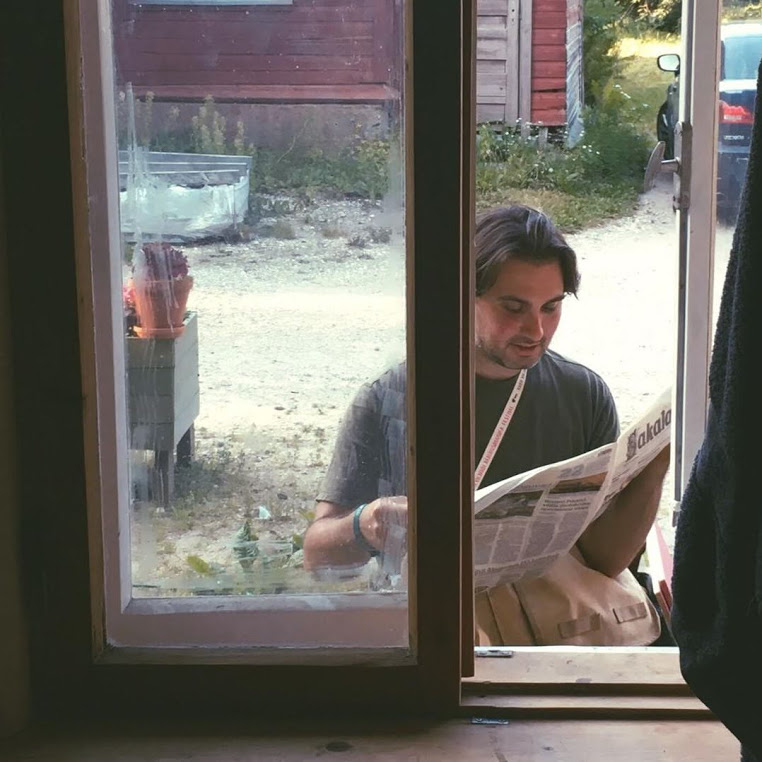
Vahur: Somehow when there are fewer places to go to and less stuff to do, the circle of people is even more tightly connected. I noticed that when I lived in Rakvere for a short time, the cultural elite there was also very interconnected.
Justin writes in English and his books are translated into Estonian. Vahur’s novel “Serafima and Bogdan” is available in Russian and the English translation has been completed, although not yet published. How does it feel to read your text in another language?
Vahur: For me, the translated text feels like my own, but it also shows the problems in the flow of the text and logic, somehow it gives a different perspective. When I write in Estonian, I just write, I don’t think so much.
It’s when I see the translation of my text that I really think about it ‒ not only if the translation is correct or not but also the deeper meaning, if the angle is right for the things. And it often makes me want to rewrite the text because I feel that I should have done it differently already in Estonian. So, a translation makes me see the value of words.
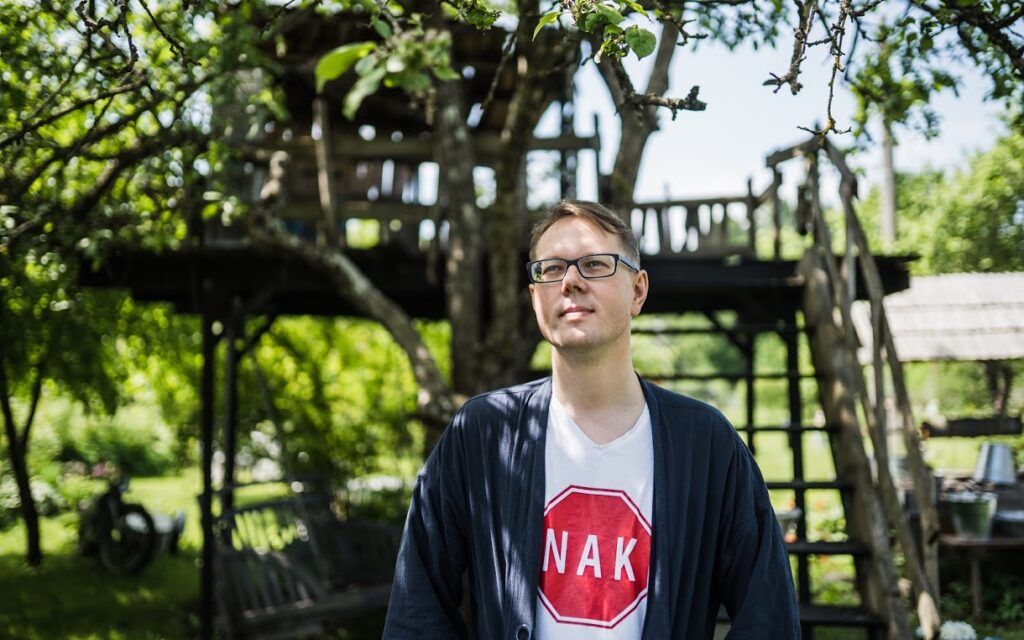
Justin: A lot of the dialogue in my books actually happened in Estonian, so I make notes sometimes in the text for the translator. For example, in “Minu Viljandi”, there’s a scene where someone asks “Kuhu sa suundud?”, which means “Where are you heading?”. “Suund” means direction, there’s a deeper meaning there like “What is your path forward?” If I had just written “Where are you heading?”, the translator could have written up “Kuhu sa lähed”, which is much more exact, like “I’m going to the store”.
So, there are subtleties in the Estonian language that I had to make sure that the translator got right. And you have to be careful not to miss the nuances. If you flip the words in Estonian, it might mean something else and even be insulting to someone if done the wrong way.
Also, there’s some stuff you just can’t say in Estonian and you have to find a different way. And vice versa, some things are so elegantly expressed with a few words in Estonian but when you try to explain them in English, you go on for three or four sentences trying to get to the point. It’s definitely interesting.
Is being a writer in Estonia somehow different from being a writer in, for example, the US or Belgium, where Vahur has lived? I guess in Estonia it’s relatively easy to get your work published, but then again impossible to sell anything above 10,000 copies.
Vahur: I think 10,000 copies is indeed the max, but I know some Flemish and Dutch writers and they don’t sell more actually. Writing and getting to big audiences is probably almost as hard as winning the lottery. But the literary crowd in Estonia is very interconnected and very lively and there are also many young people involved, while in Belgium, for example, literature is mainly for older people.
Justin: I think for me, as a writer, it’s probably very liberating to write in Estonia. First of all, in the US there’s a literary establishment built around education. You have these elite schools people go to ‒ not just universities, but also prep schools, high schools. And if you start out without getting your master’s of fine art from one of the elite universities, it’s a pretty steep hill to climb as a writer and break into the mass market.
Then there are also different themes that Americans are obsessed with – and it’s also trickled down to Estonia. Race, racism, sex, sexism, gender… I wonder if you could write a book about a bunch of Old Believers in a little fishing village on Lake Peipus and have people pay attention to it in the US without a major twist like the main character being transgender. From my perspective, there’s a kind of freedom in Estonia that you can write about what the neighbour is doing and it’s somehow interesting. But in the US, if I did that, I don’t know how interesting it would be.
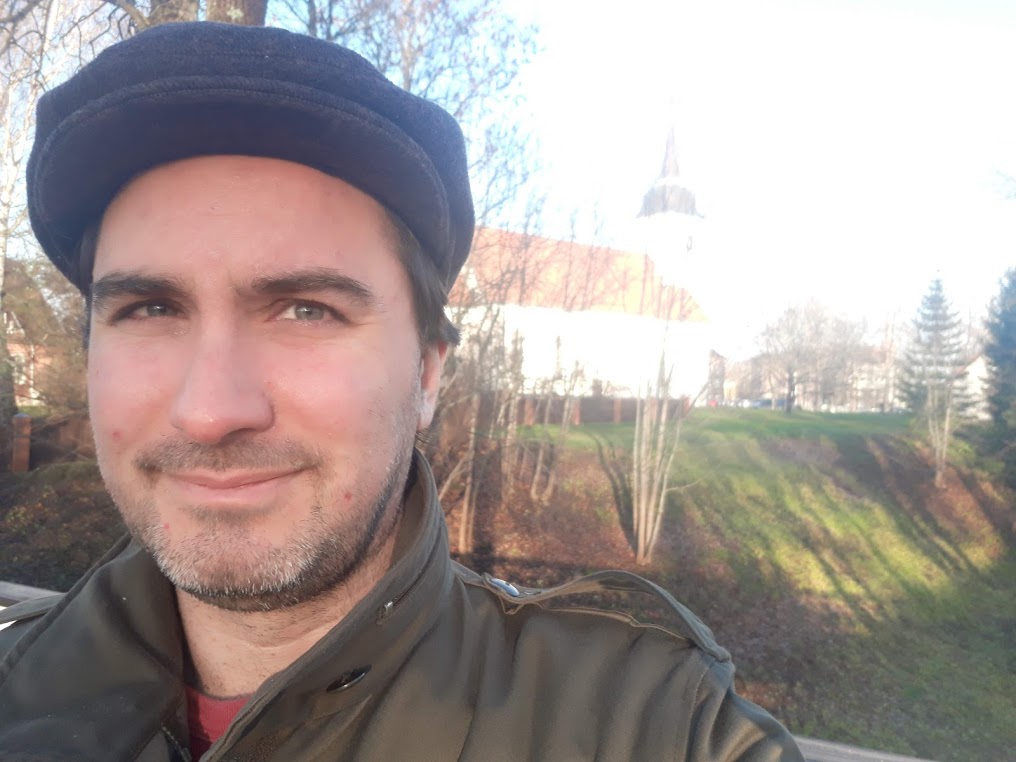
Also, although I’m personally somewhat sceptical about applying for state funding, it’s very hard to support a lively cultural scene with the rules of laissez-faire capitalism. In the Nordic countries, there are programmes that support culture, they invest in art, whereas in the US you’re on your own.
In Estonia or Sweden, to be a writer is a respectable position. I was just watching a movie with my daughter last night about a writer in LA and the whole setup was that he’s a loser who can’t find a real job. A dreamer who thinks his novel is going to sell one day but it never will. So being a writer is more looked down upon as opposed to being respected.
Writers have always been independent thinkers. There have been concerns that certain self-censorship might be emerging these days out of fear of “landing on the wrong side” or alienating one’s followers. Is it more difficult to be controversial at the age of social media?
Vahur: I’d like to think that I am not afraid and not influenced by trends but of course I’m also influenced by everything and probably don’t quite notice it. But I like provocation, at least to some extent.
Just yesterday I thought about the power of the word ‒ how and why it has happened that we’re giving so much value to a word or a couple of words, not a whole meaning. Not a whole sentence, not a whole book, just some words. So it suddenly becomes compulsory to use some other words, but it doesn’t really change anything.
As a writer, I honestly say that we should read the full text and the idea, not just pick on some specific words. Words are almost like letters – if you take the alphabet separately, there isn’t much meaning or point. So, it’s as if deciding that the letter Z is controversial and we have to replace it with S.
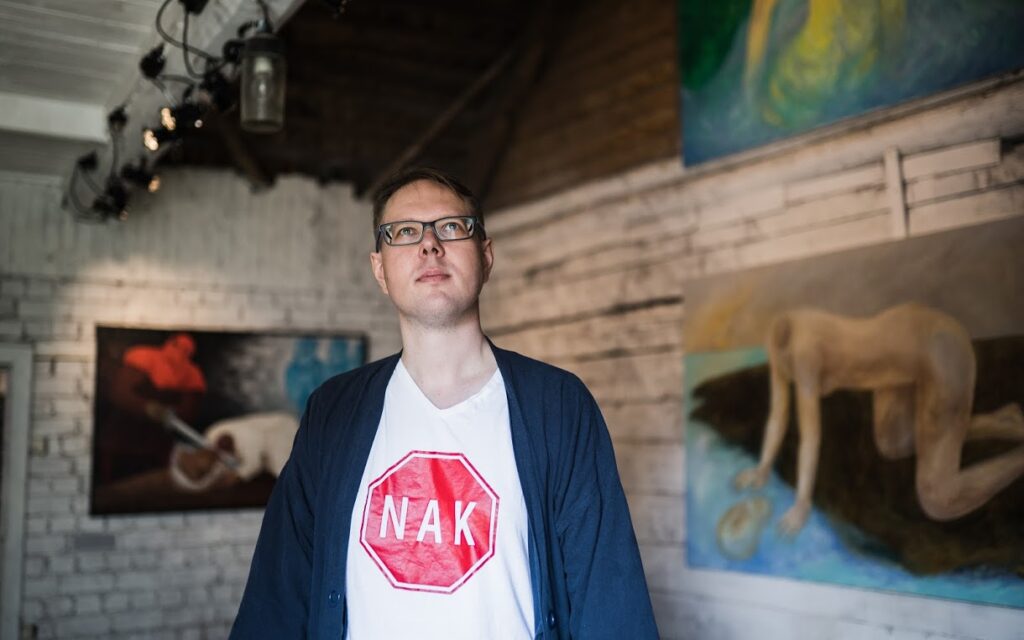
Justin: I know that if I write something critical about, let’s say, the EKRE party, then my Facebook feed is going to go crazy with people arguing about liberals and conspiracy theorists and stuff. It’s like asking for trouble. So I wouldn’t do it. I have to ask how much of my life I am willing to invest in having an argument with a bunch of people on the internet. But there are other ways to make your point and maybe in some ways you can influence people without being so direct.
Vahur: Irony is something that people somehow seem to not get so much. But irony and satire, especially if done gently, would be a very good way to express also controversial stuff.
You’re both very good observers of people. How have Estonians changed in the past 10-20 years?
Justin: I think society has changed a lot since I first came here in 2002-2003. The generations shifted because, at that time, we were the young generation. The old generation was the one that had lived through World War Two and the Stalinist period and they were just so resigned to fate, fatalistic. Like, whatever happens will happen and there’s nothing to be done about it.
That heavy feeling has kind of lifted because a lot of those people are just not here anymore. So maybe society has become a little bit more active and optimistic in that sense that you actually can change things and rather quickly.
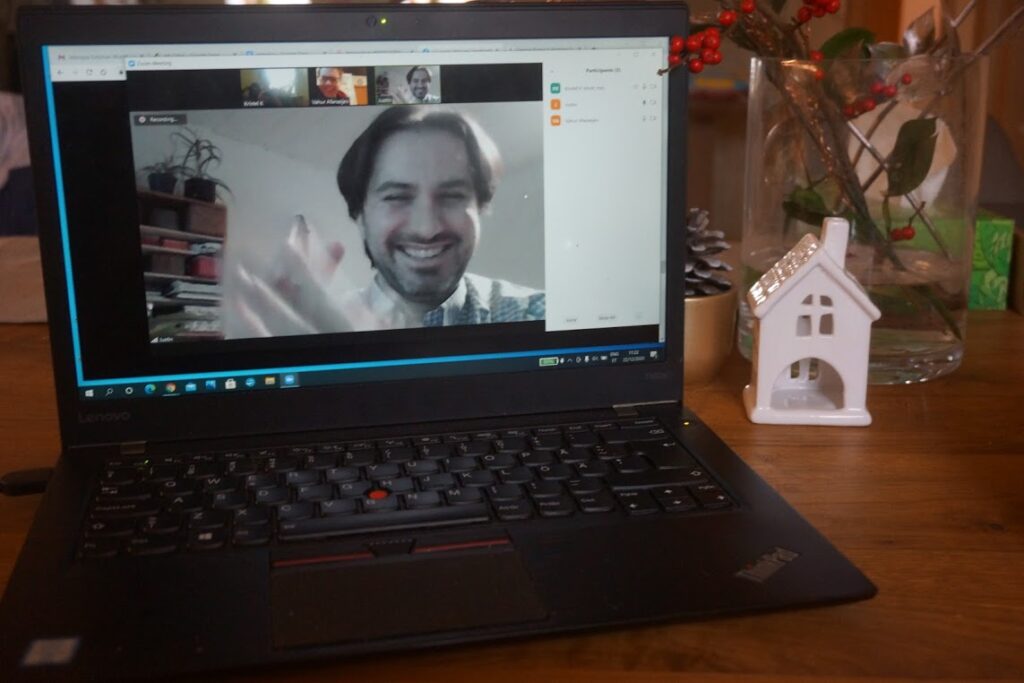
Vahur: I think this heavy feeling that Justin mentioned started lifting already during the 90s, which actually weren’t so horrible at all. Maybe I’m wrong but I’ve felt this feeling in Ukraine, for example – where not all, but many young people still have this feeling that you can’t do anything. So, optimism is coming to Estonia more and more. But maybe at some point, it gets a little bit too naive and stupid as well? Can the younger generation understand there could be anything beyond pandemic or lack of money to keep them grounded in Estonia?
I remember the story from the 90s, maybe it was an anecdote, how somebody was explaining Soviet mass deportations in a foreign country and someone from the audience asked: “But when the soldiers came, why didn’t the people didn’t just call the police?”. Maybe this naivety will backfire at some point. Maybe it’s the best time for Estonia, maybe we’re in an excellent position because we still remember the Soviet time and can draw comparisons, but also see the future.
And then there are some traits in the Estonian character that do not change…
Justin: When I was researching “Minu Viljandi”, I was reading biographies of Johann Laidoner and Jaan Tõnisson, Estonian statesmen, because they were both from Viljandi. And I noticed some things had not changed since the 19th century. Laidoner’s father was a workaholic farmer who worked himself basically to death trying to build the farm.
I see this activity with people all the time. In the summer, they’re out working until midnight, and I always wonder: nothing’s going to happen if you go to sleep, and start again tomorrow. No one’s watching you. And no one’s going to judge you if you don’t finish it today. It’s all in your mind…
Tõnisson was also a workaholic. He would work from six o’clock in the morning until sunset every single day and summer on the farm. And they were very proud of how hardworking they were. I think that also hasn’t changed. The Estonian people are still like this, they have this word “tubli”. You know, Tõnisson was “megatubli”. He was just like the most “tubli” person that ever existed. That hasn’t changed. And I don’t think it will.
To end the conversation on a literary note, would you share some book recommendations with the readers?
Vahur: I am reading some old stuff, like Arthur Miller at the moment. But I am very much looking forward to reading “Minu Viljandi” because I have some friends there and it has always seemed an interesting place. So hopefully Justin has captured Viljandi’s vibe and its different angles. Plus, for an Estonian, it’s always interesting to read what a foreigner thinks of us, though Justin is probably not a foreigner anymore.
Justin: I really like the books of Icelandic writer named Sjón. He is writing historical fiction, which should be boring ‒ who cares about Iceland in the 18th century, right. And yet he inserts some magical realism elements and, in the end, you’re just like, wow, this is great. There is this indifference to suffering and grotesque that becomes really entertaining, which is maybe there in Estonian literature, too.
Cover: Justin Petrone (private collection) and Vahur Afanasjev (photo by Kiur Kaasik).

